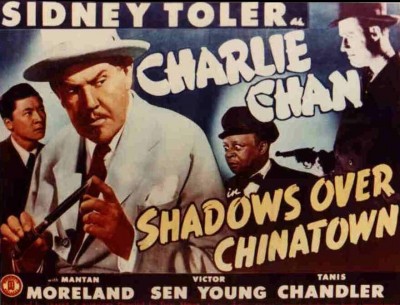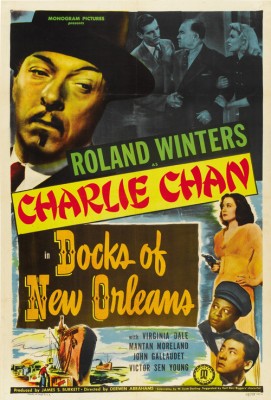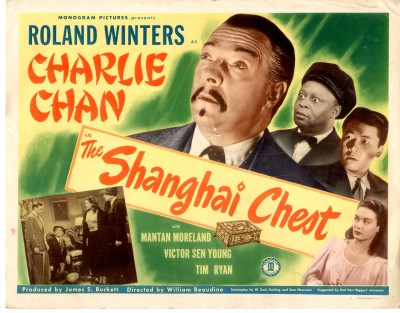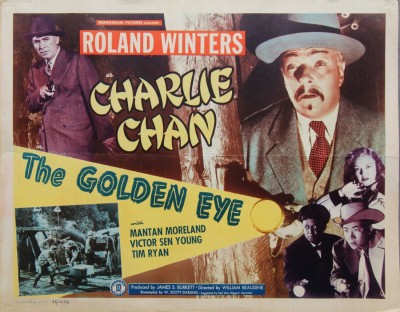| Reviews & Columns |
|
Reviews DVD TV on DVD Blu-ray 4K UHD International DVDs In Theaters Reviews by Studio Video Games Features Collector Series DVDs Easter Egg Database Interviews DVD Talk Radio Feature Articles Columns Anime Talk DVD Savant Horror DVDs The M.O.D. Squad Art House HD Talk Silent DVD
|
DVD Talk Forum |
|
|
| Resources |
|
DVD Price Search Customer Service #'s RCE Info Links |
|
Columns
|
|
|
Charlie Chan Collection (Shadows Over Chinatown / Docks of New Orleans / Shanghai Chest / The Golden Eye)
Instead, the series wound up at lowly Monogram, the third-rate Poverty Row studio best remembered today for its East Side Kids/Bowery Boys movies and campy Bela Lugosi/John Carradine/George Zucco horror films. The Chan series' budgets dropped from around $200,000 per picture at Fox to $75,000 at Monogram, most of which were shot in ten or twelve days.
Much less care went into the writing of these later films. They lack the rich proto-noir atmosphere of the ‘30s Fox films and as mysteries the Monograms pretty much suck rocks. But Toler was still fun to watch and, best of all, the movies all feature African-American comedian Mantan Moreland, an extremely underrated, reliably funny comic actor that shamefully misguided political correctness unjustly shuttered into obscurity for decades. Anyway, when Toler died in 1947 Monogram took no chances, hiring a hearty if then obscure actor named Roland Winters to replace him. Later, there was talk of moving the series lock, stock, and barrel to England (Monogram had funds tied up there) but when the British Pound was devalued the idea was abandoned and the series ignominiously ended.
Where Fox released DVDs of all the extant Fox Chan films, rights to Monogram's film library are confusingly divided among Warner Bros., MGM and, apparently, Paramount. Warner Bros. themselves released a much more compact batch o' Chans themselves some time back, as a DVD set also called Charlie Chan Collection, though as a TCM Spotlight Collection title.
This one, with pressed DVDs and not DVD-Rs, includes four more titles: Shadows Over Chinatown (1946), Docks of New Orleans, Shanghai Chest, and The Golden Eye (all 1948). Not counting the four early Warner Oland titles presumed lost, that leaves just a couple of Chan films yet to be released to DVD.
"Sometimes, surgeon's scar speak louder than fingerprints."
Shadows Over Chinatown was Sidney Toler's penultimate Chan. The main thing distinguishing this otherwise tepid entry is that it reintroduces actor Victor Sen Yung as Jimmy Chan, Charlie's No. 2 son. He'd played the character in the last eight Fox films with Toler, and had not been seen since 1942's Castle in the Desert. Victor Sen Yung was not as good an actor nor as memorable as Keye Luke, who had played elder brother Lee Chan during the Warner Oland years, and who was more energetic and excitable than Jimmy. But Sen Yung was certainly a big improvement over Monogram's clumsy attempts to replace him with less talented (and more importantly for Monogram, much cheaper) Asian actors. Victor Sen Yung, like Keye Luke, could play the very Americanized Chinese-American ("Hey, Pop!") in a way that amusingly contrasted Toler's more traditional Chinese immigrant, and Sen Yung has good screen chemistry with the Monogram series' comedy relief, Mantan Moreland as Birmingham Brown, Charlie's chauffeur.
The plots of these invariably incoherent Monograms hardly matter, but for the record this one has Charlie investigating the grim murder involving an armless, legless torso.
The film opens aboard a bus bound for San Francisco. Interestingly, for these scenes Charlie Chan (Sidney Toler), son Jimmy (Victor Sen Yung), and black chauffeur Birmingham Brown (Mantan Moreland) all sit at the front of the bus, while the other passengers, all white, sit behind them. Though clearly staged that way for no other reason than the cameraman's convenience, I'll bet that didn't go over well in Deep South. Having just seen Bus Stop (1956), an expensive Fox film starring Marilyn Monroe, the contrast between that bus interior set and this one is striking. So cheap is Monogram's set that the featureless bus interior is like a giant cardboard box with seats. And curtains. Later what's supposed to be a morgue is represented by a two particleboard walls painted to look like marble.
In San Francisco, Chan visits the Bureau of Missing Persons, where he consults with Captain Allen (Alan Bridge) about the case and another he's just taken on: the search for a young woman named Mary Conover (Tanis Chandler), whose Scottish grandmother (Mary Gordon, Mrs. Hudson from the Rathbone-Bruce Sherlock Holmes films) is worried sick.
Shadows Over Chinatown ain't much, but it does have a couple of nice ideas rare by this point in the series. One is Charlie's relationship with a roguish old pickpocket, Cosgrove, played by perennial screen drunk Jack Norton. The cast, with character veterans such as Norton, Gordon, and Bridge, is a bit better than average as well. Toler, past seventy and growing ill, nonetheless looks just fine onscreen playing what a Variety reviewer described as the "sage slant-eyed sleuth." (**1/2 out of *****)
"The ignorant always loud in argument."
Filmed in less than ten days, Docks of New Orleans is pretty tepid. It was Roland Winters's second appearance as Charlie Chan, and though physically quite different from Toler, he basically imitates Toler's interpretation of the character. Winters's Wikipedia entry makes this observation: "Some consider him an ineffective successor to Oland and Toler; others defend him for his unique approach to the character. Oland's Chan was shrewd and placid, Toler's was observant and crabby, and Winters' was generally sarcastic and impatient." That's sort of true, but I'd argue that Oland's Chan was outwardly more deferential, courteous, and warm, yet who also knew how to use prejudices and presumptions about his race and English ability to his advantage, and he was amused by this. More importantly, Oland's Chan loved his family while Toler's Chan barely tolerated them. Toler's Chan was indeed crabby.
That Monogram would pluck Winters out of relative obscurity is odd considering that his frizzy hair and steely blue eyes make him the least convincingly Asian of the three non-Asian actors, though he was by far the healthiest. At 44, he was younger even than Keye Luke, who'd return as Chan's No. 1 son for the last couple of entries.
The lack of enthusiasm put into Docks of New Orleans is exemplified by the script, which is actually a pretty close remake of Mr. Wong, Detective (1939), Monogram's first attempt to create a Charlie Chan-like mystery series, which starred Boris Karloff. If you've seen that film you won't need a scorecard here.
The basic plot involves the murder (and later murders) of partners of a New Orleans-based chemical company, and concerns that some of these chemicals are being shipped out of the country (represented by a typically cheap dockyard set, basically a cargo hold door). The murders somehow are connected to the use of poisonous gas hidden in radio tubes.
The film is occasionally fleetingly amusing. Chan notices a copy of Da Vinci's Mona Lisa hanging on a wall. "Ah, charming portrait," he says, as if unaware of its fame. In another scene Jimmy Chan, inexplicably from here on called Tommy, and Birmingham Brown practice a musical number they've whipped up, called "Chop Suey Boogie," though it's painfully clear neither of them is actually playing their instruments. Mantan Moreland has a nice bit with black actor Haywood Jones, as Mobile Jones, a riff of Moreland's signature "incomplete sentence" routine, though better, more complete versions appear in other Chan films. (**)
"Surprised detective might just as well clutch iron ball and dive in lake" or, better put, "Winters's Chan excellent cure for restless insomniac."
Dull as dishwater, Shanghai Chest opens with the stabbing death of San Francisco Judge Wesley Armstrong (Pierre Watkin). Moments later the judge's nephew, Victor (John Alvin) is knocked cold by the assailant, his identity hidden beneath a heavy overcoat that looks like the coat hanger is still underneath. And, wouldn't you know it, Victor regains consciousness dazedly holding the bloody murder weapon just as the police arrive.
Meanwhile, Tommy and Birmingham Brown follow an apparent burglar into the home of District Attorney Frank Bronson (Russell Hicks). (Tommy urges Birmingham to go first, reasoning "You'll be harder to see in the dark.") Unfortunately, the burglar is actually the D.A. himself, trying to get into his own locked house, and the two would-be sleuths are thrown into jail.
Soon after, Bronson himself turns up dead, shot, and a juror is found hanged. Evidence would seem to point to a man tried, convicted and executed six months before. Can Charlie Chan solve this baffling (and bafflingly dull) mystery?
Not much here. This was the first of three series turns by Tim Ryan, Irene "Granny" Ryan's ex-husband, as police Lt. Mike Ruark, but he's not especially memorable. Indeed, other than the welcome appearance of character actors Tristram Coffin and Philip Van Zandt, the only thing about the picture stirring this reviewer's near-somnambulistic state was the strange unbilled cameo of African-American actor Willie Best.
Best, who sometimes worked under the not-exactly flattering stage name "Sleep ‘n' Eat," was a talented comedian who tended to play the worst racial stereotypes. He'd been in a couple of the Toler Chans, but my hunch is Mantan Moreland must have got him this half-day bit part so that Best could pay some bills. Having been bailed out of jail, Birmingham and Tommy are walking past some cells when Birmingham recognizes Willie Best playing, apparently, actor Willie Best, in jail after an attempted bank robbery. Odd.
As for the movie, (* 1/2)
"So much for so much."
The Golden Eye, as opposed to GoldenEye, benefits somewhat from a thankful change of venue. In this entry, a weird fusing of genres, Charlie, Tommy, and Birmingham go west to investigate attempts on the life of an Arizonia gold mine owner Manning (Forrest Taylor). They check in as guests at the nearby Lazy Y Dude Ranch where Charlie bumps into Lt. Mike Ruark (Tim Ryan), working undercover and masquerading as an obnoxious drunk.
Manning's gold mine, the Golden Eye, long thought to be played out, is suddenly producing up a huge fortune in ore. Manning himself, however, is bedridden, unable to speak and his head completely wrapped in bandages, under the Lady Vanishes-like care of a suspicious Catholic nun/nurse, Sister Teresa (Evelyn Brent).
The Golden Eye is a slight improvement over the earlier Roland Winters Chans. The novelty of the Western setting helps, and it's fun to see an enthusiastic Birmingham Brown and Tommy Chan play cowboy, dressing up like Roy Rogers and Gene Autry. (Charlie, however, stubbornly sticks to his usual attire.) After a first reel set in San Francisco (and not-bad backlot streets), the film shifts to the Arizona dude ranch, apparently a real Santa Clarita, California resort of some kind. Regardless, it's very photogenic, while our three heroes spend another big chunk of the film down in the gold mine, elaborate sets by Monogram's standards, possibly left over from another film. Overall it looks more expensive than the last several Chan films combined.
The mystery aspects, though easily solvable, at least play fair with the audience for a change, and the film ends, strangely, with Mantan Moreland walking straight into the camera lens. (** 1/2)
Video & Audio
Each film gets its own DVD case and its own real, made-in-Mexico DVD, not DVD-Rs. The quality of the transfers, all full-frame and black and white, are exceptionally good, far superior to other contemporaneous Monogram films, e.g., the Bowery Boys series, Jimmy Wakely, Bomba the Jungle Boy. The Chans are comparatively pristine. The mono audio, English only, is also good, and unusual for minor catalog DVD titles these days, the discs offer subtitle options in English, French, and Spanish. No Extra Features.
Parting Thoughts
Those not familiar with the once-great Charlie Chan movie series are advised to skip this and instead seek out Fox's boxed sets of Warner Oland Charlie Chan movies from the 1930s, which are still enormous fun. This Charlie Chan Collection is for die-hard fans only, those working toward a set of the complete series on DVD, and who can appreciate what extremely modest pleasures even these mostly bad films still offer. For them, this is Recommended.
Stuart Galbraith IV is a Kyoto-based film historian whose work includes film history books, DVD and Blu-ray audio commentaries and special features. Visit Stuart's Cine Blogarama here.
|
| Popular Reviews |
| Sponsored Links |
|
|
| Sponsored Links |
|
|
| Release List | Reviews | Shop | Newsletter | Forum | DVD Giveaways | Blu-Ray | Advertise |
|
Copyright 2024 DVDTalk.com All Rights Reserved. Legal Info, Privacy Policy, Terms of Use,
Manage Preferences,
Your Privacy Choices | |||||||



















